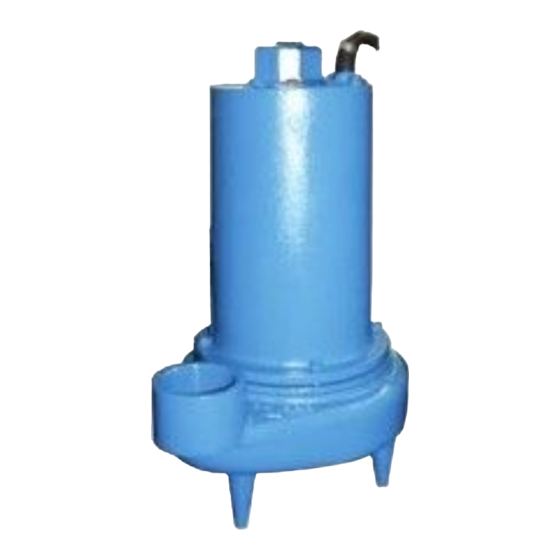Barnes 3SE-DS Series Installations- und Betriebshandbuch - Seite 5
Blättern Sie online oder laden Sie pdf Installations- und Betriebshandbuch für Industrielle Ausrüstung Barnes 3SE-DS Series herunter. Barnes 3SE-DS Series 17 Seiten. Submersible sewage ejector
Auch für Barnes 3SE-DS Series: Installations- und Betriebshandbuch (20 seiten), Installations- und Betriebshandbuch (18 seiten)

SECTION B: GENERAL INFORMATION
B-1) To the Purchaser:
Congratulations! You are the owner of one of the finest pumps
on the market today. CP&S pumps are products engineered
and manufactured of high quality components. Over one
hundred years of pump building experience along with a
continuing quality assurance program combine to produce a
pump which will stand up to the toughest applications. This
manual will provide helpful information concerning installation,
maintenance, and proper service guidelines.
B-2) Receiving:
Upon receiving the pump, it should be inspected for damage
or shortages. If damage has occurred, file a claim immediately
with the company that delivered the pump. If the manual
is removed from the packaging, do not lose or misplace.
B-3) Storage:
Short Term- CP&S Pumps are manufactured for efficient
performance following short inoperative periods in storage.
For best results, pumps can be retained in storage, as factory
assembled, in a dry atmosphere with constant temperatures
for up to six (6) months. Long Term- Any length of time
exceeding six (6) months, but not more than twenty-four (24)
months. The unit should be stored in a temperature controlled
area, a roofed over walled enclosure that provides protection
from the elements (rain, snow, wind-blown dust, etc.), and
whose temperature can be maintained between +40 deg. F
and +120 deg. F. (4.4 - 49°C). Pump should be stored in its
original shipping container. On initial start up, rotate impeller
by hand to assure seal and impeller rotate freely. If it is
required that the pump be installed and tested before the long
term storage begins, such installation will be allowed provided:
1.) The pump is not installed under water for more than
one (1) month.
2.) Immediately upon satisfactory completion of the test,
the pump is removed, thoroughly dried, repacked in the
original shipping container, and placed in a temperature
controlled storage area.
B-4) Service Centers:
For the location of the nearest Barnes service center, check
your Barnes representative or Crane Pumps & Systems, Inc.,
service Department in Piqua, Ohio, telephone (937) 778-8947
or Crane Pumps & Systems Canada, in Brampton, Ontario,
(905) 457-6223.
SECTION C: INSTALLATION
C-1) Location:
These pumping units are self-contained and are
recommended for use in a sump, lift station or basin. This
pump is designed to pump sewage, effluent, or other
nonexplosive or noncorrosive wastewater and shall NOT be
installed in locations classified as hazardous in accordance
with the National Electrical Code (NEC), ANSI/NFPA 70 or
Canadian Electrical Code. Never install the pump in a trench,
ditch or hole with a dirt bottom; the legs will sink into the dirt
and the suction will become plugged.
C-1.1 Submergence:
It is recommended that the pump be operated in the
submerged condition and the sump liquid level should never
be less than dimension "A" in Figure 1.
FIGURE 1
C-2) Discharge:
Discharge piping should be as short as possible. Both a
check valve and a shut-off valve are recommended for
each pump being used. The check valve is used to prevent
backflow into the sump. Excessive backflow can cause
flooding and/or damage to the pump. The shut-off valve
is used to stop system flow during pump or check valve
servicing.
Barnes supplies a breakaway fitting discharge system
designed to allow the submersible wastewater pump to be
installed or removed without requiring personnel to enter the
wet well.
Place the Break Away Fitting (BAF) in position. Temporarily
secure the guide rails in the upper mounting brackets and
locate the base on the bottom of the wet well. Level the base
with grout and/or shims. Install the intermediate support
brackets, if required. Make sure the rails are in a true vertical
position so the pump will clear the access opening and
will slide freely down the rails into place on the discharge
stationary fitting. Once the rails are in proper alignment,
bolt the base into the floor of the station and connect the
discharge pipe to the elbow. Connect the movable portion
and other supplied fittings of the BAF onto the pump and
lower into wet well. See the Break Away Fitting manual for
more information.
C-3) Liquid Level Controls:
The level controls are to be supported by a mounting bracket
that is attached to the sump wall, cover or junction box. Cord
grips are used to hold the cords in place on the mounting
bracket. The control level can be changed by loosening
the grip and adjusting the cord length as per the plans and
specifications. Be certain that the level controls cannot
hang up or foul in it's swing and that the pump is completely
submerged when the level control is in the "Off" mode.
5
Recommended Submergence Level
Minimum Submergence Level
A = 10"
Bottom of Feet
